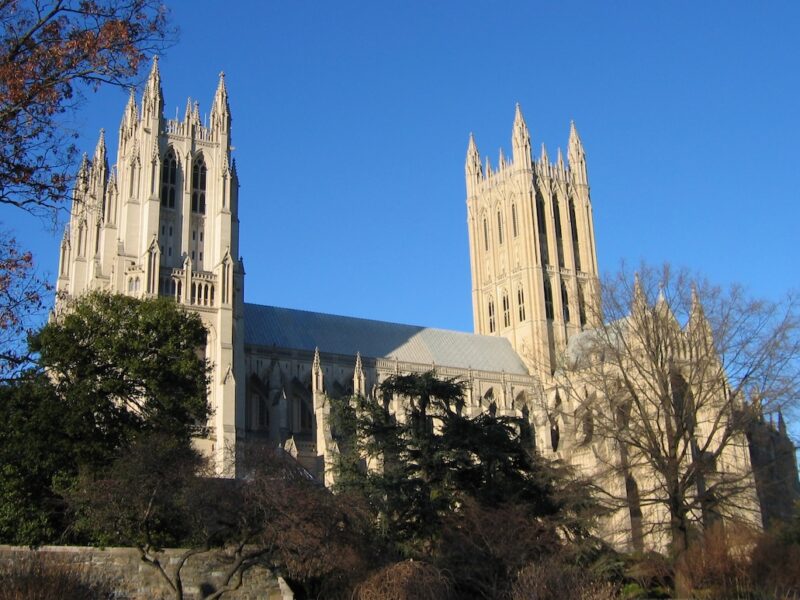In modern Christianity, Anglicanism is often misunderstood, even by its most devoted adherents. This is undoubtedly true for a variety of reasons, but the result is that we often do a pretty poor job of articulating the essence of Anglicanism, and that’s partly because it’s a trickier proposal to articulate than “we’re Catholic” or “we’re Evangelical.” You might be saying “we’re both” and true enough, but that requires some unpacking. The both/and answer demands a little more engagement than most people are ready for, and it’s not the subject of thousands of YouTube apologists’ videos (hundreds, maybe?). Resources for articulating the “Reformed Catholic” nature of Anglicanism (and the magisterial Reformation in general) often veer into the weeds of denominational priorities or historical debates, rather than deliver the goods in an easily digestible statement. In an effort to make things as simple as possible, I offer the following.
My Elevator Pitch for Reformed Catholicism
- Tradition is like a long-term marketing campaign. For our purposes, “tradition” is like the Church’s evangelistic “marketing,” or spreading the (good) news, about Jesus Christ. That’s not meant to be an insult. Some marketing is honest and promotes something good actually…but obviously, it’s not always so nice.
- It follows then that some important truths have had pretty bad marketing at times. Think: Athanasius defending the incarnation “contra mundum,” but it’s also true that certain errors or missteps have been real crowd-pleasers at times too (like the Arianism that Athanasius rejected).
- Most reasonable Christians acknowledge this reality, that both truth and error can and have gained popular, even institutional approval (Athanasius was repeatedly banished for the truth after all), but it’s how we choose to address this problem that often divides our communities.
- Each group has sort of developed its own way of managing truth vs error, apart from some of the agreed conciliar statements we all affirm. Just like those councils, fresh errors (or permutations of old ones) will force fresh articulations of the truth.
- For my money, the Catholic tradition that is most honest about the need to engage in this kind of business, and the real possibility for error both past and present, is the Reformed-Catholic movement of the Protestant Reformation.
- Modern evangelical Protestants might not be used to seeing themselves in this “Catholic” light (many are descended from Revivalistic or Anabaptist traditions, after all), but the Reformers most certainly did. The Reformation gets blamed for all manner of division; modernity, secularity, and so on, but try examining those Catholic truths we’ve uniquely preserved or developed, especially in our confessional statements.
- The Vincentian Canon is helpful for remembering what we all agree on, but a lot of time has passed and just as in St Vincent’s day new errors have necessitated clearer articulation of essential truths. The Reformation “solas” come to mind as unique and legitimate developments of Reformed-Catholicism.
This isn’t meant to be some kind of exhaustive explanation or robust argument for the Reformed-Catholic position. What I hoped to accomplish here is simply a helpful shorthand that you can use to effectively convey this worldview or perspective to an outsider. So next time you find yourself at dinner (or in an elevator) with an antagonistic Christian who doesn’t seem to get Anglicanism or the Reformed-Catholic understanding it relies on, give this a try! I’d love to hear how it goes. For a fuller account of Anglicanism in particular, you might want to check out another article here.





'An Elevator Pitch for “Reformed Catholicism”' have 4 comments
August 22, 2024 @ 12:27 am Wesley Mcgranor
There is no such thing.
August 27, 2024 @ 4:35 pm Bryce Lowe
Thanks for the thoughtful analysis.
September 17, 2024 @ 1:28 pm Mack
“Catholic” existed in Greek before the Christian era as an adjective that seems to have been invented by combining “broken” (cata) and “whole” (holic) thereby describing an aggregate, a jumble, or wide mix of many things all combined together, i.e., the whole kit and caboodle. Somebody thought it an apt description of the wide variety of churches with many different sorts of people forming one whole of the body of Christ, and after that the term seems to have became a popular buzz-word in Christian circles. After persecution ended, Imperial councils began to define “official” Christian doctrines, the term became a sort of brand-name of approved status with the Edict of Thessalonica for those who held to the correct view of the Trinity and otherwise professed the orthodox beliefs then held by the Damasus, the Bishop of Rome, and by Peter, the Bishop of Alexandria. That official definition of the word probably includes most Christians today, even Baptists, since it was not an endorsement of whatever the Roman Pope should thereafter decree, or a demand that all should obey the Pope of Rome, but simply setting him and the Bishop of Alexandria as examples at that time of correct belief. Of course, when the Western Church split from the East, it tried to take the title “Catholic” as its exclusive property, denying it to the Greek Orthodox, and likewise denying it to the Reformers when they split off. Neither the Orthodox nor Anglicans have conceded Rome’s right to do so, but both retain their claim to describe themselves as “Catholic” also, in the original sense of the word.
September 17, 2024 @ 2:07 pm Mack
(ps., of course, most dictionaries will give a different definition for the prefix cata- and say that it means \”down\” (among other things), but I suspect that\’s a misapprehension because fitting it to examples is often rather strained. For example, catalogue might be as supposed \”down [in writing] a count\” but is more likely the \”breaking out [in a list] that which is counted\”; and cataclysm might be a \”down-flood\” but more probably \”broken up by a flood\”; and catacombs, might be the \”under tombs\” but more likely \”broken [a maze] caves\”; a cataract, might be the \”down [flow] of river\” more likely it\’s the break in the river [due to rocks]. Perhaps catabolic, meaning to \”break down [molecules] to smaller\” shows the correct sense of cata- as combining both down and broken. See also, category, catapult, cathode, catalyst, catacoustic, etc.)